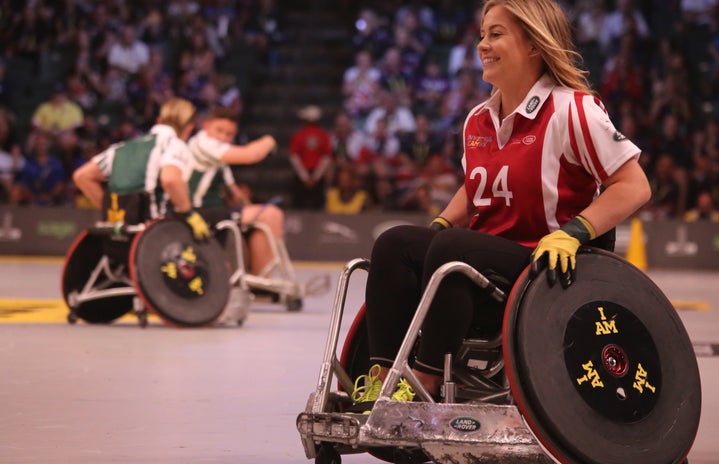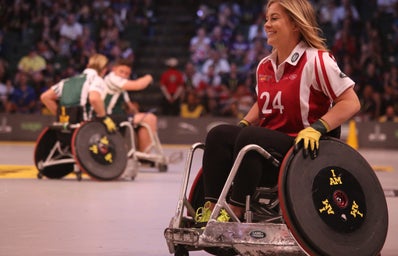Unfortunately, female paralympic athletes do not have the recognition and visibility they deserve. These competitors participate in several competitions, but one of the most important ones, considered by the public and by themselves, is the Paralympics. Even though it is an Olympic competition and Brazil is a country with great potential, it does not come close to having the same number of viewers as the Olympics. With this in mind, here are 8 women para-athletes you should know.
- Evelyn de Oliveira
-
Evelyn Vieira de Oliveira was born on August 17, 1977, in Mauá, state of São Paulo. Evelyn is a bocce player in the BC3 class, in which the athletes with the greatest degree of motor impairment are. Diagnosed with Spinal Muscular Atrophy, she has no movement in her lower limbs and limitations in her upper limbs. Her debut representing Brazil in the Paralympics was in 2016, in Rio de Janeiro, when she won the gold medal, alongside Evani Soares and Antonio Leme.
- Débora Menezes
-
Débora Bezerra Menezes is a parataekwondist in the K44 class, in which athletes with amputated arms are placed. She was born on May 18, 1990, in São Paulo. The paralympic athlete reported that, since the beginning of her sports career, she has always seen women who gave her strength to not give up and conquer her space. In the last Paralympic Games (Tokyo 2020), Débora won a silver medal for Brazil and, in addition, another two athletes (Nathan Torquato and Silvana Fernandes) who accompanied the Brazilian taekwondo team were also awarded.
- Maria Carolina Santiago
-
Maria Carolina Gomes Santiago was born in Recife, on August 2, 1985. Maria is a swimmer in the S13 class, for athletes with visual impairment. In the Tokyo Paralympic Games, the athlete stood on the podium in five of the six events she participated, winning three gold medals, a silver and a bronze, and being one of the most awarded Brazilian athletes in history. Maria Carolina was diagnosed with a syndrome called “Morning Glory”, which affects the nervous system and reduces her vision to 30% of capacity. In the TV show Encontro com Fátima Bernardes, after her last gold medal, Maria said she wishes her results can inspire new athletes and that girls see that it is possible to achieve their dreams.
- Silvânia Costa
-
Silvânia Costa de Oliveira was born on May 23, 1987, in the city of Três Lagoas, in Mato Grosso do Sul. She is the two-time Paralympic long jump champion in the T11 class, for people with visual impairment. After winning the gold medal in Tokyo, Silvana said it was a relief to become the champion of the race. The athlete gave birth to her son João Guilherme in 2016 and, due to the pandemic, the competitions were paralyzed. As a result, she was only able to train five months before the Tokyo Paralympic Games. Even so, the athlete had a great race and achieved excellent results.
- Ádria Santos
-
Ádria Rocha Santos was born on August 11, 1974, in Nanuque, Minas Gerais. Her last participation in the games was in Beijing 2008, where she won the bronze medal in the 100m dash in the T11 class, referring to athletes with visual impairment who can be guided by up to two athletes-guides during the course. Adding up all the achievements of her career, Ádria won 13 medals in track and field events, making history in Paralympic sports and becoming the biggest female medalist in the country. Currently, the former athlete does para cycling and is a commentator for the Paralympics.
- Aline Rocha
-
Aline was born on February 20, 1991, in the city of Pinhão, Paraná. In the Pyeongchang 2018 games, the athlete was the first Brazilian woman to participate in the winter paralympics, competing in cross-country skiing in the LW11 class, for seated athletes. Despite competing in the snow, the athlete entered the paralympic competitions through athletics, in the T54 class, referring to wheelchair racing. Aline has paraplegia of the lower limbs, caused by an automobile accident that caused a fracture in the third lumbar vertebra, when she was only 15 years old.
- Alana Maldonado
-
Alana Martins Maldonado was born on July 27, 1995, in the city of Tupã, São Paulo. At the age of 14, Alana was diagnosed with Stargardt’s disease, which causes progressive loss of vision. The athlete represents Brazil in Judo, competing in the B2 class. Her debut was in the Rio 2016 Paralympic Games, in which she won the silver medal. In her second participation in the games, in Tokyo, she won the competition in the category up to 70kg, the first gold medal in the history of women’s paralympic judo for Brazil.
- Cátia Oliveira
-
Cátia Cristina da Silva Oliveira was born on June 12, 1991, in Cerqueira César, state of São Paulo. When the athlete was 16 she suffered a car accident and became paraplegic, losing the movement of her legs. As a result, she abandoned her dream of playing for the Brazilian soccer team and started playing table tennis. Cátia has already competed in the 2016 Paralympics in Rio de Janeiro, and in the Tokyo 2020 games she won Brazil the bronze medal.
Awesome, isn’t it? These women and their stories are inspiring and should get the visibility they deserve! Let’s support women in paralympic sports!
————————–
The article above was edited by Giovana Lins Barbosa.
Liked this type of content? Check out Her Campus Casper Libero for more!


